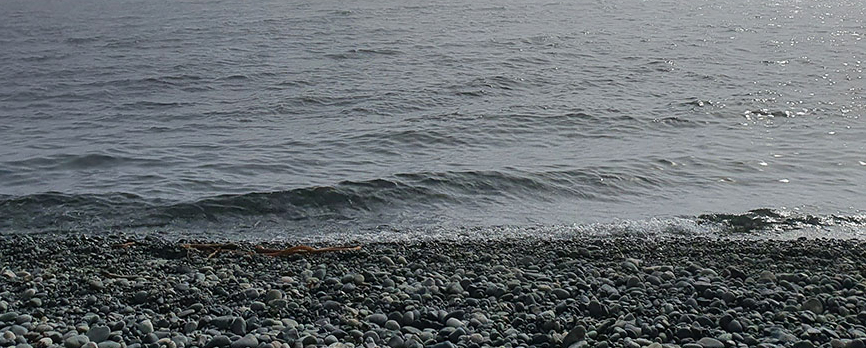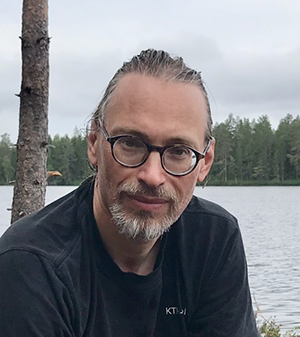He examines adaptations in society to climate change during times of deep uncertainty

Per Wikman Svahn is a researcher at the Division of Philosophy and examines, among other things, decision-making strategies during times of deep uncertainty, philosophical aspects of worst-case scenarios, and how we can better adapt society to climate change and make better decisions to minimize risks.

Per Wikman Svahn has a background in civil engineering and during his studies, he came into contact with ethics and technology and that was where the interest in philosophy grew.
– I studied in Linköping and became fascinated by the field of philosophy while studying for a master's degree. After I graduated, I worked as a civil engineer for a few years but then felt that I became more and more interested in social issues and philosophy.
It can be more or it could be less
Per received his doctorate at KTH 2012 in philosophy and wrote his dissertation on radiation protection and the risks of radiation and the ethical aspects surrounding it. After his doctoral studies, he worked at the Swedish Defense Research Agency FOI, where he began working on how to manage the risks of climate change.
– I have especially worked with climate adaptation to handle decisions in the event of deep uncertainty. It is about how we can adapt society and systems to the climate changes that we know are coming. Because climate change has already started and it is ongoing and here whatever we do with it can be more or it could be less. This depends on emissions, etc.
The problem with planning for the future, Per believes, is that there are very large uncertainties in how large climate change will affect in the long term.
– This is due to scientific uncertainties that come from the fact that we do not know how the global climate will react to increased greenhouse gases. These uncertainties are even greater for how individual sites will be affected. But it's not just about scientific uncertainties. Here is also the political development, on how much we are prepared to reduce emissions and invest. This in turn is linked to economic and technical developments. The consequence of this is that there will be very large uncertainties about how climate change will affect our local communities in the long term.
Decisions today have far-reaching consequences
Since 2015, Per Wikman Svahn at KTH has been working on projects related to climate adaptation.
– A project that ends this year is about how we adapt society to rising sea levels. This is an important area because decisions we make today have far-reaching consequences. For example, decisions about railways and districts are things that will probably affect our societies for hundreds of years in the future.
Together with his colleagues, Per investigates methods for dealing with climate change. The methods come from the USA, Great Britain, and the Netherlands and are tested to see how they work in a Swedish context.
– On the one hand, we have made an overview of knowledge of existing methods, but also selected a couple of methods and adapted and tested them in a Swedish context. We have also identified obstacles to using them in Sweden.
Swedish laws hinder flexibility
Obstacles found are that Swedish laws are not designed for flexible solutions. This is a problem because the best and cheapest solutions often require flexibility. Then it is deemed too expensive and involves too much intervention to build it today for the worst-case scenarios.
– It is the basis, what you often land in, that it is too expensive. So it will instead be that you theoretically would like flexible solutions. But as mentioned, this is not supported by what current laws say about spatial planning. This is an area that needs to be developed more for more flexible solutions. There is also a kind of conflict between short-term and long-term interests depending on who finances and may bear the costs in the end.
According to Per, it is about working to prepare for upcoming events.
– It is important to think beforehand, I usually say. To have a plan for how we should act if it happens and not be completely unprepared and reactive. Unfortunately, it is often only when a disaster occurs, such as a flood that one thinks something needs to be done. A lot of research is about doing the right thing from the beginning.
One way to counteract reactionary and unprepared actions are to make people see the seriousness before something happens.
– This is not aimed at the public but decision-makers. We have had workshops where we go through different scenarios for what can happen. It is about not being afraid of uncertainties but highlighting and seeing what we can do when they happen. To dare to think the thought. Then it is of course difficult to know what to do, but somehow you have to start, Per Wikman Svahn explains.
Embraces uncertainties to reduce gnawing
According to Per, decision-makers who have worked on the projects have reacted positively to preventive work on uncertainty and risks.
– It seems to be a relief because you dare to talk about uncertainties and what can happen. If you pretend that there are fewer uncertainties than there are, there is still something gnawing in there, something that does not feel quite right and a knowledge that there is something you have not thought of. I usually say that the methods are characterized by embracing the uncertainties.
Philosophy can help identify and analyze basic patterns, processes, ideas, and assumptions that are often implicit. Philosophy can also study different ethical perspectives, including what fundamental values we try to promote or protect and what ethical principles we should have, according to Per.
– It is a perspective that I feel that those we have worked within the projects, mainly municipalities and
decision-makers in climate, are very interested in.
Per Wikman Svahn also teaches a course in risk philosophy that addresses risk and uncertainties as well as ethical aspects.
– It is a course for students at the advanced level and doctoral students. We also have a course for professionals that is popular and called risk philosophy for professionals. Many that take the courses work in different fields and bring with them their practical examples.
Text: Hanna Kalla
This is the 20th article in the School of Architecture and the Built Environment's new series of articles on selected research, education or collaboration initiatives from each department. You can find the previous articles here: Archive
